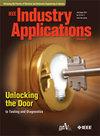Optimal Energy Management for Residential House Aggregators with Uncertain User Behaviors Using Deep Reinforcement Learning
IF 4.5
2区 工程技术
Q2 ENGINEERING, ELECTRICAL & ELECTRONIC
引用次数: 0
Abstract
This paper addresses the home energy management (HEM) problem for a large number of residential houses, which can be regarded as a high-dimensional optimization problem. To cope with the high-dimensional issue, the concept of the aggregator is utilized to reduce the state and action space. And a two-stage deep reinforcement learning (DRL) based approach is proposed for the aggregators to track the schedule from the superior grid and guarantee the operation constraints. In the first stage, a DRL control agent is set to learn the optimal scheduling strategy interacting with the environment based on the soft-actor-critic (SAC) framework and generate the aggregate control actions. In the second stage, the aggregate control actions are disaggregated to individual appliances considering the users’ behaviors. The uncertainty of the EV charging demand is quantitatively described by the driver’s experience. An aggregate anxiety concept is introduced to characterize both the driver’s anxiety on the EV’s range and uncertain events. Finally, simulation studies verify the effectiveness of the proposed approach under dynamic user behaviors, and the comparisons also show the superiority of the proposed approach over the method mentioned in benchmarks.基于深度强化学习的不确定用户行为的住宅聚合器最优能量管理
本文研究了面向大量住宅的家庭能源管理问题,该问题可以看作是一个高维优化问题。为了解决高维问题,利用聚合器的概念减少状态和动作空间。提出了一种基于两阶段深度强化学习(DRL)的聚合器从上级网格跟踪调度并保证运行约束的方法。在第一阶段,设置DRL控制代理学习基于软角色-评论家(soft actor-critic, SAC)框架的与环境交互的最优调度策略,并生成聚合控制动作。在第二阶段,考虑用户的行为,将聚合控制动作分解到单个设备。电动汽车充电需求的不确定性是由驾驶员的经验定量描述的。引入了总体焦虑的概念来描述驾驶员对电动汽车行驶里程和不确定事件的焦虑。最后,仿真研究验证了所提方法在动态用户行为下的有效性,对比也显示了所提方法优于基准测试中提到的方法。
本文章由计算机程序翻译,如有差异,请以英文原文为准。
求助全文
约1分钟内获得全文
求助全文
来源期刊

IEEE Transactions on Industry Applications
工程技术-工程:电子与电气
CiteScore
9.90
自引率
9.10%
发文量
747
审稿时长
3.3 months
期刊介绍:
The scope of the IEEE Transactions on Industry Applications includes all scope items of the IEEE Industry Applications Society, that is, the advancement of the theory and practice of electrical and electronic engineering in the development, design, manufacture, and application of electrical systems, apparatus, devices, and controls to the processes and equipment of industry and commerce; the promotion of safe, reliable, and economic installations; industry leadership in energy conservation and environmental, health, and safety issues; the creation of voluntary engineering standards and recommended practices; and the professional development of its membership.
 求助内容:
求助内容: 应助结果提醒方式:
应助结果提醒方式:


